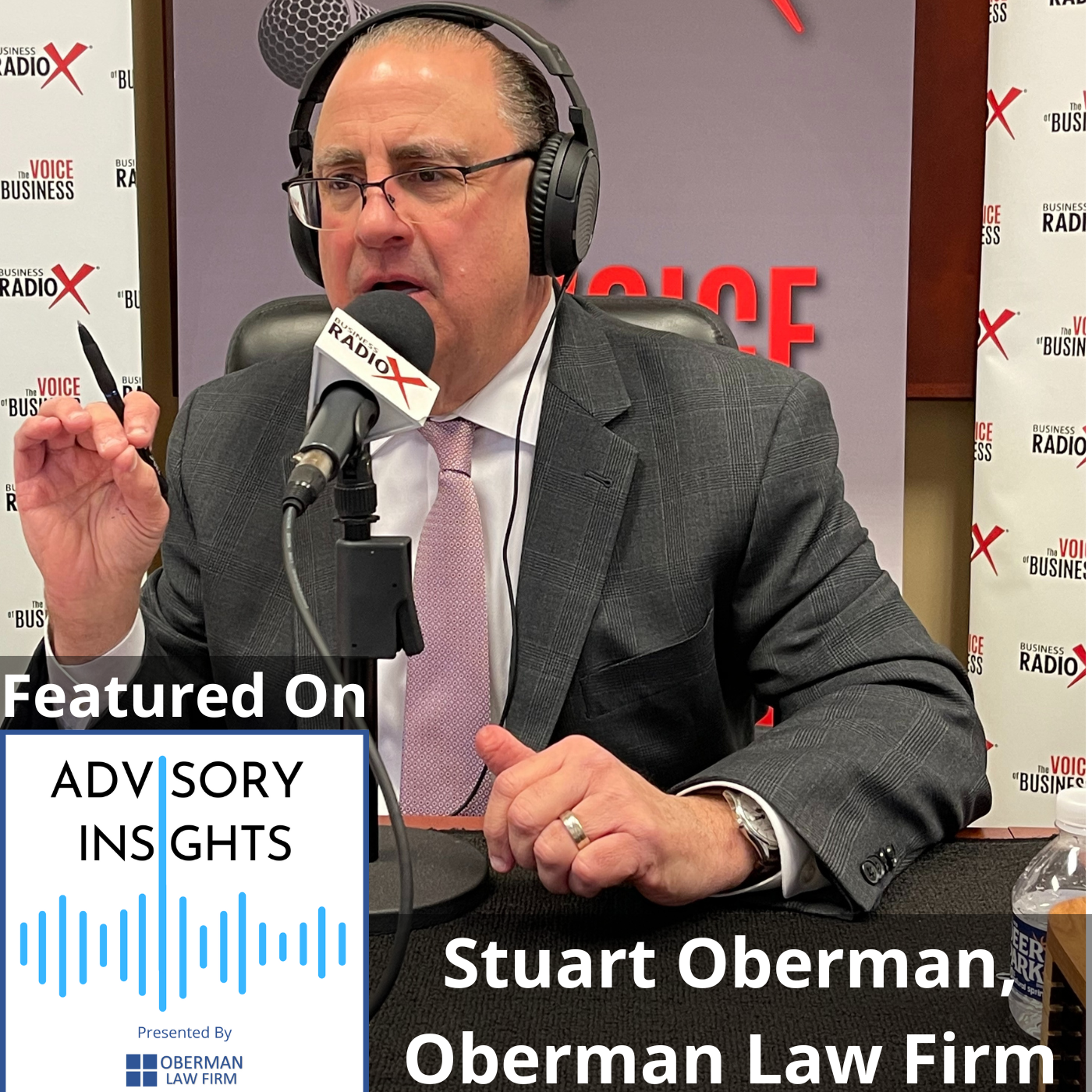
FTC Cracks Down on Companies Non-Compete Restrictions (Advisory Insights Podcast, Episode 30)
On the episode of Advisory Insights, Stuart Oberman of Oberman Law Firm discussed how the Federal Trade Commission (FTC) is cracking down on companies that have non-compete restrictions. Stuart gives a quick update on the current state of non-compete agreements, noting that there is a lot of uncertainty and that this could have a chilling effect on the professional fields.
Advisory Insights is presented by Oberman Law Firm and produced by the North Fulton studio of Business RadioX®. The series can be found on all the major podcast apps. You can find the complete show archive here.
TRANSCRIPT
Intro: [00:00:01] Broadcasting from the Studios of Business RadioX, it’s time for Advisory Insights. Brought to you by Oberman Law Firm, serving clients nationwide with tailored service and exceptional results. Now, here’s your host.
Stuart Oberman: [00:00:20] And welcome everyone to Advisory Insights. Stuart Oberman here, your host. All right. Folks, we’re going to be off and running today on the podcast. An enormous topic that is taking the business world by extreme uncertainty. We’ve got fires going everywhere. I want to talk about the FTC cracks down on company’s non-compete restrictions.
Stuart Oberman: [00:00:44] So, I want to briefly review this particular matter because this is a prelude to what I think the Federal Government is going to do down the road. So, I want to review a release dated January 4, 2023 that the FTC released. And I want to look at some broad things on this.
Stuart Oberman: [00:01:07] So, what happened is the FTC has taken action against three companies, two individuals – get this – forcing them to drop non-compete restrictions that would have imposed thousands and thousands of workers with restrictions. So, what does this mean?
Stuart Oberman: [00:01:27] So, according to the FTC, each of the companies and individuals illegally – illegally – impose non-compete restrictions on workers in positions that range from low level security guards to manufacturing workers to engineers that just stepped into the professional markets – engineers – which barred them from seeking or accepting another employer or operating a competing business after they left the company. Folks, that is extremely, extremely problematic going down the road.
Stuart Oberman: [00:02:13] Now, one of the things we need to look at in this particular order – and you’ve got to sort of read between the lines on this, what the FTC said – they issued a statement that they are going to vigorously – cannot just enforce, but vigorously – enforce Section 5, which prohibits unfair methods of competition. Which, from all indications is going to be non-compete agreements.
Stuart Oberman: [00:02:44] So, in each these cases – and I’m not going to go into names because it’s all public record, but I want to look at the ramifications – the FTC ordered the companies to cease enforcing, threatening to enforce, or imposing non-compete restrictions on relevant workers. Now, understand that. The FTC said, the government said you are not going to enforce these. You’re not going to threaten employees – which means you cannot allegedly send a letter of a cease and desist that if you do this, you’ll have this penalty, your contract says this, you’re going to be sued, whatever – or impose non-compete restrictions on relevant workers. So, they’ve also required – again, far reaching effect – the employer should notify the infected employees that they are no longer bound by the restrictions.
Stuart Oberman: [00:03:51] So, you got to understand this. They said, “Oh, by the way, three companies, two individuals, we’re nullifying your non-compete agreements.” And not only that, but now you’ve got to notify the employees that, “Oh, by the way, we’re not enforcing your non-compete.”
Stuart Oberman: [00:04:08] So, I want to go through some things that the FTC, in this order – which I’m going to give you my opinion. It’s going to be a prelude of what’s down the road. There’s a lot of things going on we need to look at, but this is the prelude – they have banned in the order the company from communicating to any relevant employee or other employer that the employee is subject to a non-compete – which means you’ve cut off communication to third parties – requiring them to void and nullify the challenge non-competes without penalizing the infected employees – without penalizing the infected employees.
Stuart Oberman: [00:04:56] Require them to provide copies of the order to current and past employees who are subject to the challenges non-compete. Again, get that, current and past employees. Require them to provide a copy of the complaint and order to current and future directors, officers, employees of the companies who are responsible for hiring and recruiting. That’s H.R., folks. That’s H.R. So, now this is their H.R. responsibility.
Stuart Oberman: [00:05:34] So then, here’s the interesting part, again, far reaching. Requires them for the next ten years – ten years, not ten days, but ten years – to provide a clear and conspicuous notice to any relevant employees that they may freely seek or accept a job with any company or person, run their own business, or compete with them at any time following their employment.
Stuart Oberman: [00:06:05] Folks, you understand what that is and how far reaching that is to these three businesses and two individuals? So, again, there’s been a lot of discussion as to what is going to take place as far as non-competes go. But what I’m giving you right now is an actual FTC release as to what occurred to these three companies and two individuals.
Stuart Oberman: [00:06:33] So, what do we do from here? I think that knowing what we know now, I think every, every, every company has got to look at their H.R. top to bottom. They’ve got to look at their non-competes. Now, are we non-solicitations, trade secrets. No. That’s non-competes. I think we’ve got to take a look at every contract. I don’t care what business you’re in, whether you’re in dental or manufacturing or global and you’ve got business in the United States. I think we need to look at every contract that has a non-compete agreement in it, and determine what the ramifications are and how broad this is.
Stuart Oberman: [00:07:11] First and foremost, we’ve got to determine, one, forget about the FTC, whether or not you’re non-compete, is it even enforceable? There’s very specific guidelines for that. It’s got to be geographically specific. It can’t be overly broad. So, there’s some very specifics. So, once we get through that that hurdle and say, “Yeah. It’s enforceable,” on a general basis, then we need to take a look at these these non-competes as a whole and figure out how as a company you’re going to approach this.
Stuart Oberman: [00:07:36] Folks, it is some Wild Wild West stuff going out there on non-compete agreements and in business environments. And I think this may have a chilling effect on, especially, the professional fields. Folks, that’s a quick update on a very, very broad topic that I could spend probably three hours on a whole event on.
Stuart Oberman: [00:07:55] But thank you again, folks, for joining us on the podcast for Advisory Insights. My name is Stuart Oberman. If you have any questions, please feel free to give us a call, 770-886-2400. Or send me an email, stuart, S-T-U-A-R-T, @obermanlaw.com Thanks, folks, and have a fantastic day.
Outro: [00:08:16] Thank you for joining us on Advisory Insights. This show is brought to you by Oberman Law Firm, a business-centric law firm representing local, regional, and national clients in a wide range of practice areas, including health care, mergers and acquisitions, corporate transactions, and regulatory compliance.
About Advisory Insights Podcast
Presented by Oberman Law Firm, Advisory Insights Podcast covers legal, business, HR, and other topics of vital concern to healthcare practices and other business owners. This show series can be found here as well as on all the major podcast apps.
Stuart Oberman, Oberman Law Firm

Stuart Oberman is the founder and President of Oberman Law Firm. Mr. Oberman graduated from Urbana University and received his law degree from John Marshall Law School. Mr. Oberman has been practicing law for over 25 years, and before going into private practice, Mr. Oberman was in-house counsel for a Fortune 500 Company. Mr. Oberman is widely regarded as the go-to attorney in the area of Dental Law, which includes DSO formation, corporate business structures, mergers and acquisitions, regulatory compliance, advertising regulations, HIPAA, Compliance, and employment law regulations that affect dental practices.
In addition, Mr. Oberman’s expertise in the healthcare industry includes advising clients in the complex regulatory landscape as it relates to telehealth and telemedicine, including compliance of corporate structures, third-party reimbursement, contract negotiations, technology, health care fraud, and abuse law (Anti-Kickback Statute and the State Law), professional liability risk management, federal and state regulations.
As the long-term care industry evolves, Mr. Oberman has the knowledge and experience to guide clients in the long-term care sector with respect to corporate and regulatory matters, assisted living facilities, continuing care retirement communities (CCRCs). In addition, Mr. Oberman’s practice also focuses on health care facility acquisitions and other changes of ownership, as well as related licensure and Medicare/Medicaid certification matters, CCRC registrations, long-term care/skilled nursing facility management, operating agreements, assisted living licensure matters, and health care joint ventures.
In addition to his expertise in the health care industry, Mr. Oberman has a nationwide practice that focuses on all facets of contractual disputes, including corporate governance, fiduciary duty, trade secrets, unfair competition, covenants not to compete, trademark and copyright infringement, fraud, and deceptive trade practices, and other business-related matters. Mr. Oberman also represents clients throughout the United States in a wide range of practice areas, including mergers & acquisitions, partnership agreements, commercial real estate, entity formation, employment law, commercial leasing, intellectual property, and HIPAA/OSHA compliance.
Mr. Oberman is a national lecturer and has published articles in the U.S. and Canada.
Oberman Law Firm
Oberman Law Firm has a long history of civic service, noted national, regional, and local clients, and stands among the Southeast’s eminent and fast-growing full-service law firms. Oberman Law Firm’s areas of practice include Business Planning, Commercial & Technology Transactions, Corporate, Employment & Labor, Estate Planning, Health Care, Intellectual Property, Litigation, Privacy & Data Security, and Real Estate.
By meeting their client’s goals and becoming a trusted partner and advocate for our clients, their attorneys are recognized as legal go-getters who provide value-added service. Their attorneys understand that in a rapidly changing legal market, clients have new expectations, constantly evolving choices, and operate in an environment of heightened reputational and commercial risk.
Oberman Law Firm’s strength is its ability to solve complex legal problems by collaborating across borders and practice areas.
Connect with Oberman Law Firm:
Company website | LinkedIn | Twitter
















